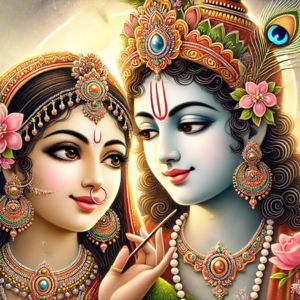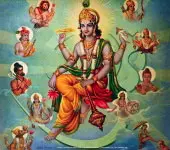In Kampilya, there lived a noble person named Yajnadatta, who was known for his virtuous conduct. He had a son named Gunanidhi, who became very wicked and a gambler. The father disowned his son due to his misdeeds. The son left home and wandered hungry for several days. One day, driven by the desire to steal food offerings, he went to a Shiva temple. There, he burned his clothes to create light, which in a way served as a lamp offering to Lord Shiva. Later, he was caught stealing and was sentenced to death. Due to his sinful actions, he was bound by the messengers of Yama. At that moment, the attendants of Lord Shiva arrived and freed him from their bondage. Being in the company of Shiva's attendants purified his heart, and he immediately ascended to Shiva's abode with them. There, he enjoyed all divine pleasures and served Uma-Maheshwara. Eventually, he was born as the son of King Arindama of Kalinga, where he was named Dama. Even as a child, he engaged in devotion to Lord Shiva with other children.
King Dama, with great joy, began to spread the principles of Shaivism everywhere. Subduing King Dama was very difficult for others. Besides offering lamps in all Shiva temples, he knew no other spirituality. He summoned all the village leaders in his kingdom and commanded, 'Lighting lamps in Shiva temples shall be mandatory for everyone. Every village leader must ensure that lamps are lit constantly in all the Shiva temples near their villages without any hesitation.' By strictly adhering to this practice throughout his life, King Dama accumulated a vast wealth of spiritual merit. Then he succumbed to the law of time (death). Due to his desire to offer lamps, he lit many lamps in Shiva temples, and as a result, in his next life, he became one among the Dikpalas and the lord of Alakapuri (Kingdom of Yakshas), surrounded by the brilliance of jewel-like lamps. Thus, even a small act of worship or devotion to Lord Shiva yields great rewards in due time.
The son of a noble person, who was always engrossed in all kinds of sins, once went to a Shiva temple to steal wealth. There, out of self-interest, he used his cloth as a wick for a lamp, dispelling the darkness above the Shiva Lingam with its light. As a result of this virtuous act, he became the king of Kalinga and developed an interest in righteousness. Later, due to the rise of his desire to offer lamps, he became the guardian of the directions by lighting lamps in Shiva temples. See how his actions led him from that sinful state to becoming the guardian of the directions, a position he currently enjoys.
This illustrates how Shiva was pleased with him. Now, let us see how his eternal friendship with Lord Shiva was established.
This is a legend from the previous Kalpa. Vishrava, son of Brahma's mind-born son Pulastya, was born, and from him, Vaishravana (Kubera) was born. In the past, by performing extremely severe penance, he pleased Mahadeva and enjoyed the rulership of Alakapuri as narrated before, built by Vishwakarma. When that Kalpa ended and Meghavahana Kalpa began, Kubera performed intense penance. Knowing the power of devotion to Shiva, which can be attained even by offering a single lamp, he went to Kashi, the city of light, and, using his mind as a jewel-like lamp, awakened the eleven Rudras. With unwavering devotion and affection, he focused his mind on Shiva, sitting motionless in meditation like a log of wood.
He performed penance for ten thousand years. Then, Lord Vishwanath, along with goddess Parvati, came to Kubera. With a cheerful heart, he looked at the lord of Alaka. Kubera was sitting still, focused on the Shiva Lingam, like a motionless log. Lord Shiva said to him, 'O Lord of Alaka, I am ready to grant you a boon. State your desire.'
Hearing this, the penance-rich Kubera opened his eyes and saw the Lord standing before him, more radiant than thousands of rising suns, with the moon spreading its light over his head. Overwhelmed by Shiva's radiance, his eyes were blinded, and he closed them again. Overcoming this, he spoke to Shiva, the supreme lord of all gods, who is beyond all desires, 'Lord, grant me the vision to see your lotus feet. O Lord, seeing you in person is the greatest boon for me. What use do I have for any other boon? O Chandrashekhara, I bow to you.'
Hearing Kubera's words, the lord of all gods, Uma's consort, touched him with his hand and restored his sight. With his vision restored, Kubera gazed at Uma with wide eyes. He wondered in his mind, 'Who is this supremely beautiful woman near Lord Shiva? What penance has she performed that surpasses even my own? Her form, her love, her fortune, and her immense beauty are all amazing.' Kubera kept repeating this. When he looked at her repeatedly with a harsh gaze, his left eye was blinded due to the glance of the goddess. Then, goddess Parvati said to Lord Shiva, 'O Lord, what is this wicked ascetic muttering while repeatedly looking at me? Please reveal the power of my penance.' Hearing this, Lord Shiva smiled and said to her, 'O Uma, he is your son. He is not looking at you with lustful eyes, but he is describing the wealth of your penance.' Speaking thus to the goddess, Lord Shiva again addressed Kubera, 'O child, I am pleased with your penance. I grant you a boon. Become the lord of treasures and the king of the Yakshas. Become the king of Yakshas, Kinnaras, and kings, the protector of the virtuous, and the giver of wealth to all. May my friendship with you remain forever, and I will reside near you always. To strengthen your love, I will stay near Alaka. Come, offer your obeisance at the feet of goddess Uma, for she is your mother. Fall at her feet with great joy.'
Having granted the boon in this way, Lord Shiva again spoke to goddess Parvati, 'O goddess of gods, be compassionate to him. He is your son.' Hearing this from Lord Shiva, the goddess of the universe, Parvati, said to Kubea with a pleased heart, 'O child, may your pure devotion to Lord Shiva always remain. Your left eye is indeed blinded, so remain with a single tawny eye. May all the boons given by Lord Shiva be yours. My son, due to your jealousy of my beauty, you will be renowned as Kubera (of distortedbody).' Having granted these boons to Kubera, Lord Maheshwara, along with goddess Parvati, returned to his abode. Thus, Kubera attained the friendship of Lord Shiva, and Kailash mountain near Alakapuri became the abode of Lord Shiva.
Learnings
- This legend about Shiva and Parvati shows themes of redemption and divine grace. Small acts of devotion, like lighting a lamp, can lead to spiritual growth. Gunanidhi transforms from a sinner to a devout king through his devotion. Kubera gains a divine position through intense penance. Their stories emphasize the power of faith and the chance for a close relationship with the divine. Shiva is compassionate and ready to forgive. Parvati guides and mediates spiritual growth. The legend shows how sincere devotion can overcome past sins. It leads to eternal friendship with the divine and spiritual rewards.
- Kubera became a friend of Shiva due to his deep devotion. His penance and commitment impressed Shiva. This friendship goes beyond being a mere devotee. It shows that divine relationships can be personal and deep. Shiva values sincere devotion and loyalty. True devotion can lead to a special bond with the divine. It is not just about worship but a genuine connection. This legend highlights the power of faith to build close ties with the divine.
- The legend emphasizes that even small positive actions such as lighting a lamp can trigger significant change in your life.
- Gunanidhi's transformation begins when he is in the company of Shiva's attendants. This reflects the principle that one's environment and the people around them can significantly influence behavior and mindset.
- Bhakti is intense love for God, regardless of the devotee's background or past actions. Kubera's devotion, despite his past, reflects this unconditional love and dedication.
- Pure devotion leads to liberation and can overcome all karmic bonds.
- Pure, selfless devotion is the highest goal and brings the devotee closest to the divine.
Comments
Read more comments
Knowledge Bank
What are female Rishis called?
Female rishis are called Rishikas.
Were the Kauravas Asuras?
The Pandavas were incarnations of Devas. After Gandharvas defeated Duryodhana and he decided to fast until death, the Asuras took him to Pathala. They told Duryodhana that his upper body was Shiva and his lower body was Parvathy. They got Duryodhana by doing tapas. Many Asuras had already possessed important Kauravas including Bhishma, Drona, and Kripa. The Asuras were controlling them. Narakasura's soul had possessed Karna. Using the bodies of the Kauravas, in fact, the Asuras were fighting Lord Krishna and the Devas who had taken birth as Pandavas. (Vana Parva,252)
Recommended for you
Bhagavata Book Protects Your Home

This audio discourse which is part of Bhagavata series tells you about the benefit of having a copy of Bhagavata at home.....
Click here to know more..What are niyamas in ashtanga yoga?

Mahalakshmi Ashtakam

नमस्तेऽस्तु महामाये श्रीपीठे सुरपूजिते। शङ्खचक्रगदाह�....
Click here to know more..